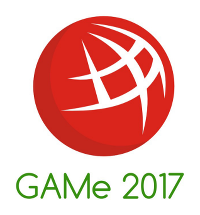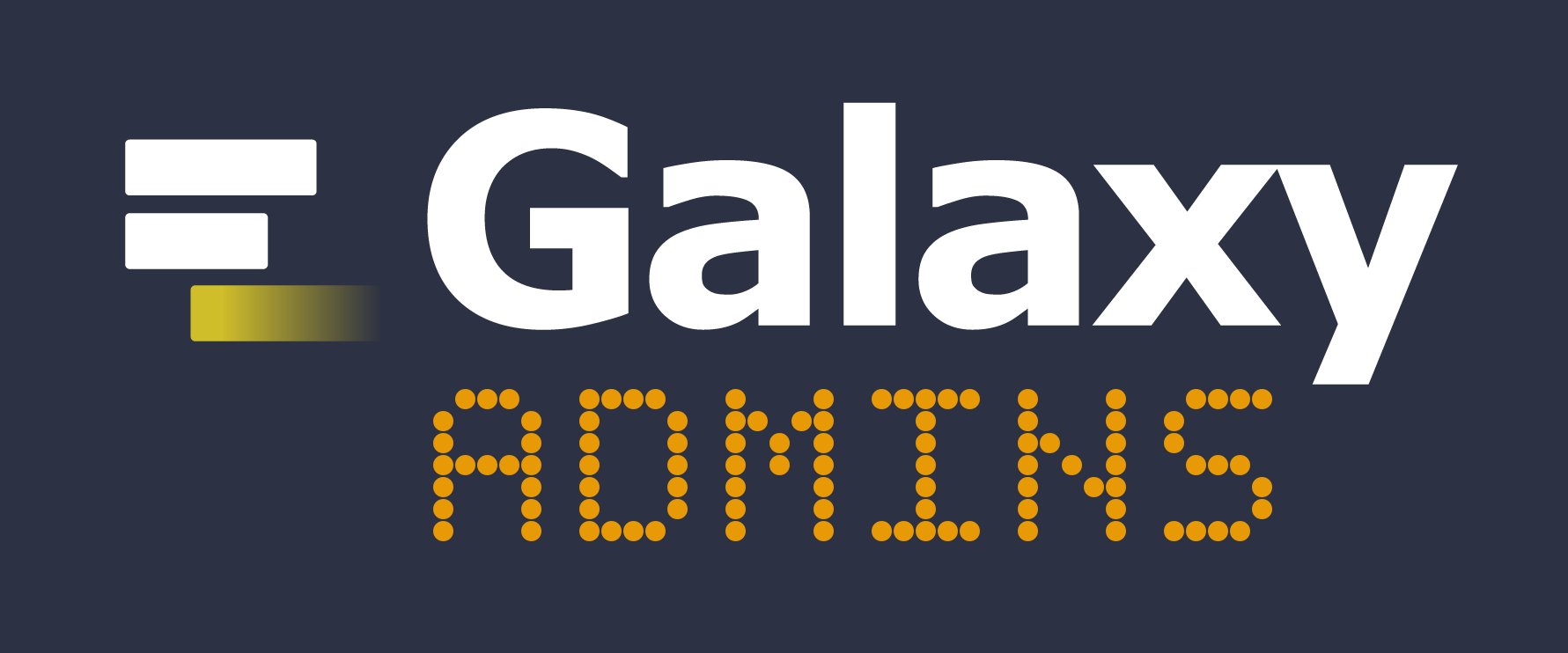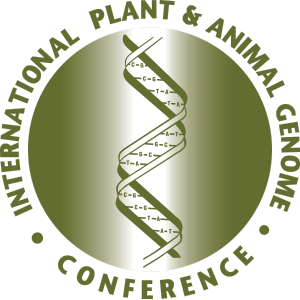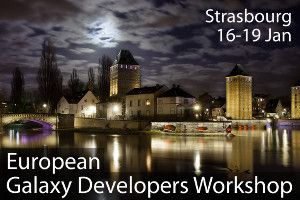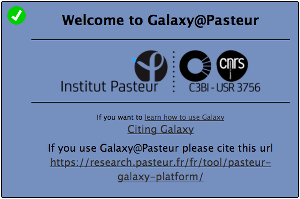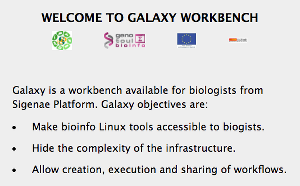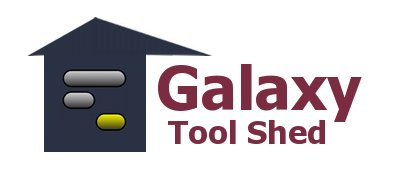January 2017 Galaxy News
Welcome to the January 2017 Galactic News, a summary of what is going on in the Galaxy community.
If you have anything to include in the next News, please send it to [Galaxy Outreach](mailto:outreach AT galaxyproject DOT org).
Events
As always here are a wealth of events coming up. Here are some highlights:
Galaxy Australasia Meeting (GAMe 2017)
GAMe 2017 will bring together biomedical researchers, bioinformaticians, infrastructure providers, and data producers from across Australia and Asia to share expertise across many levels.
This meeting features three distinct events:
- Researcher Training Day on 3 February, aimed at biomedical researchers who need to analyse their biological data
- The GAMe 2017 Conference starts 4 February and features two full days of keynotes, accepted and sponsor talks, poster and sponsor sessions, birds-of-a-feather gatherings, a conference dinner and lots of opportunities for networking.
-
Each day has a theme, and participants can register for one or both days.
- A four day workshop on Galaxy server administration runs 5-9 February. This is the 2nd time this workshop has been offered. The first time was last month and it was very well received. Don't miss your chance to attend.
Keynote Speakers
We are pleased to announce that the keynote speakers for GAMe 2017 will be James Taylor and Björn Grüning. These two probably don't need introductions in a Galaxy newsletter, but here are some brief ones anyway:
Dr James Taylor is the Ralph S. O’Connor Associate Professor of Biology and associate professor of computer science at Johns Hopkins University. He is a Galaxy Project PI, and one of the original developers of the Galaxy platform for data analysis. His group works on extending the Galaxy platform, and understanding genomic and epigenomic regulation of gene transcription through integrated analysis of functional genomic data.
Dr Björn Grüning is with the Bioinformatics Group at Albert-Ludwigs-Universität Freiburg, in Freiburg Germany, where he heads the Freiburg Galaxy Project. His publication list includes several papers that feature Galaxy prominently, including the recent “Enhancing pre-defined workflows with ad hoc analytics using Galaxy, Docker and Jupyter” (Grüning, et al, 2016. He is a prominent contributor to, and is a driving force in, the Galaxy community. In the past year alone, he helped organize the Bioconda Contribution Fest, Swiss-German Galaxy Days, the Galaxy Training Materials Contribution Fest, the Galaxy DevOps Workshop, and the Conda Dependencies Codefest, and presented and taught at GCC2016. His research interests include data visualisation, computational chemistry, and drug discovery.
Poster abstracts and late oral presentation Abstracts
Accepted talks will be presented during the 2-day conference, 4-5 February. Talks are 20 minutes long and the meeting is single track.
Poster abstract submission is open until we run out of poster space. Abstracts are limited to 250 words. Poster abstracts are reviewed on a rolling basis and submitters will be notified of the decision within two weeks of the abstract’s submission date.
On-time oral presentation abstract submission has passed but you can still submit late abstracts. Late abstracts are considered as cancellation happens and if the schedule shifts. Abstracts are limited to 250 words.
Register Now
Register now and avoid late registration rates.
GalaxyAdmins Screencasts
Screencasts for the August and December GalaxyAdmins meetups have been published:
- August
-
Dynamic Job Expansion: Experiences using Makeflow in Galaxy, Nick Hazekamp, University of Notre Dame
-
- Galaxy Training Materials: Community creation, curation, and use, Björn Grüning and Bérénice Batut, University of Freiburg
- The new Galaxy Hub: Community creation, curation, and use, Dannon Baker, Johns Hopkins University
- Video
All upcoming events
There are a plenitude of Galaxy related events coming up in the next few months:
| |
Designates a training event offered by GTN member(s) |
See the Galaxy Events Google Calendar for details on other events of interest to the community.
Galaxy Community Hub Update
We are continuing the transformation from our old MoinMoin based wiki to a GitHub based site refered to as the Community Hub, or just the Hub.
And we need your help to finish the move.
The Hub uses GitHub Flavored Markdown for markup, and Metalsmith for web site rendering and for semi-structured content (such as the Events page). The new platform offers the strength of our old wiki (easy contribution) with a markup language many more people know, easy programmatic access, and all the strengths of GitHub.
Once the Hub is in better shape it will become the galaxyproject.org site. Until then you can find it at new.galaxyproject.org. Once the move is complete and the old wiki will be shut down and those URLs will redirect to the new site.
Content was automatically converted from MoinMoin and Creole markup to Markdown, and many other things were also cleaned up in the process. However, the automatic translation stumbled in some places and the cleanup and general restructuring are far from done. We also aren't yet taking advantage of Metalsmith to render semi-structured content and page metadata.
We are using GitHub issues and a Gitter channel to coordinate work.
New Publications
99 new publications referencing, using, extending, and implementing Galaxy were added to the Galaxy CiteULike Group in Decmeber.
Some highlights from December:
- Chapter 13. Using Galaxy for Proteomics Candace R. Guerrero, Pratik D. Jagtap, James E. Johnson, Timothy J. Griffin; in Proteome Informatics, edited by Conrad Bessant. (2016), pp. 289-320, doi:10.1039/9781782626732-00289
- EuPathDB: the eukaryotic pathogen genomics database resource Aurrecoechea et al., Nucleic Acids Research (29 November 2016), gkw1105, doi:10.1093/nar/gkw1105
- GeneSeqToFamily: the Ensembl Compara GeneTrees pipeline as a Galaxy workflow Anil S. Thanki, Nicola Soranzo, Wilfried Haerty, Matthieu Muffato, Robert P. Davey, bioRxiv 096529; doi: https://doi.org/10.1101/096529
- Integration of EGA secure data access into Galaxy Hoogstrate et al., F1000Research 2016, 5(ELIXIR):2841 (doi: 10.12688/f1000research.10221.1)
Publication Topics
| # | Tag | # | Tag | # | Tag | # | Tag | |||
|---|---|---|---|---|---|---|---|---|---|---|
| 54 | methods | 24 | usepublic | 22 | workbench | 13 | refpublic | |||
| 11 | usemain | 4 | cloud | 4 | uselocal | 4 | reproducibility | |||
| 3 | tools | 2 | unknown | 1 | isgalaxy | 1 | howto | |||
| 1 | other | 1 | visualization | 1 | usecloud |
Who's Hiring
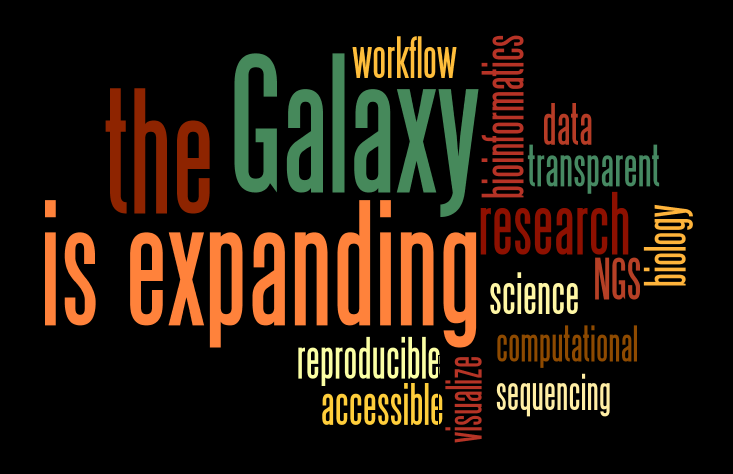
The Galaxy is expanding! Please help it grow.
- [Scientific Research Programmer](http:// goo.gl/cMZVCn), Sethuraman Lab, California State University San Marcos. Develop model-based population genomics pipelines.
- Réalisation de modules d'interoperabilité entre la base de données OMICmDB et l'instance Galaxy de la Plateforme d’Exploration du Métabolisme de l’INRA de Clermont Ferrand-Theix. Date de validité: 06/01/2017
- Development Scientist (Bioinformatics), New England Biolabs, Ipswich, Massachusetts, United States.
Got a Galaxy-related opening? Send it to outreach@galaxyproject.org and we'll put it in the Galaxy News feed and include it in next month's update.
Public Galaxy Server News
There are over 90 publicly accessible Galaxy servers and six semi-public Galaxy services. Here's what happened with them in December.
New Public Galaxy Servers
Galaxy@Pasteur
-
Link:
-
Domain/Purpose:
- General purpose genomics analysis server.
-
User Support:
-
Quotas:
- Anonymous access is supported with a reduced quota; anyone can create an account.
-
Sponsor(s):
- C3BI Insitute Pasteur
Galaxy Sigenae / BioInfo Genotoul
-
Link:
-
Domain/Purpose:
- Galaxy Sigenae / Genotoul is specialized in SNP, RNAseq, sRNAseq, metagenomics, CHIP-seq, statistics.
-
Comments:
-
User Support:
- Email Support
- The user-galaxy-toulouse mailing list is used to distribute information to all users of the Galaxy Sigenae platform.
-
Quotas:
- BioInfo Genotoul platform reserves the right to purge all files not accessed since 120 days on work/disk space.
-
Sponsor(s):
- Hosted by BioInof Genotoul platform. Supported by Europe and Région Occitanie.
New Semi-public Galaxy Services
Cancer Computer
-
Links:
-
Eligibility:
- Cancer or related research only.
-
Comments:
- 2 x Dual Hexacore HP DL380 with 288GB each Tools for genomics, proteinomics & sequence analysis We can load tools on request
-
User Support:
- Best effort by email. For SLA support, please contact.
-
Quotas:
- Free to approved academic users Up to 6 Cores, 64GB RAM per user, less than 90 days.
- Larger, private instances available, please contact (>16Cores, >64GB, MPI, GPU customizable instances available in private cloud)
-
Sponsor(s):
Galaxy Community Hubs
 |
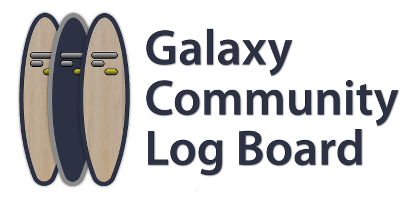 |
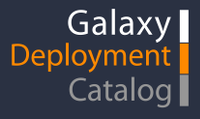 |
| Share your training resources and experience now | Share your experience now |
No new resources were added to community hubs in December.
Releases
October 2016 Galaxy Release (v 16.10)
The Galaxy Committers team is pleased to announce the October 2016 (v16.10) release of Galaxy.
Security
An arbitrary code execution vulnerability in two tools and an XSS vulnerability with the upload tool were identified this release cycle and have been fixed concurrently with the release. In addition, the fixes have been backported to older releases.
The Galaxy Committers would like to thank David Wyde for disclosing these vulnerabilities. Details follow:
- The vulnerable tools are “Filter GFF data by attribute” and “Filter GFF data by feature count”, both of which are provided with and enabled by default in the Galaxy server. These two tools share code with each other and the more general “Filter data on any column using simple expressions” tool. The latter was fixed in a previous security disclosure but these GFF variants of the tool were missed when updating the Filter tool. These tools use the Python eval and exec functions and do not properly sanitize input to these functions. The fix for this issue has been applied to Galaxy releases back to v14.10 and can be found in Commit c1e3087
- An uploaded file’s name was not properly sanitized, and so a specially crafted filename uploaded to the Galaxy server could be used as an XSS attack vector. The fix for this issue has been applied to Galaxy releases back to v16.07 and can be found in Pull Request 3278.
Highlights
- Galaxy UI plugins - Webhooks: We introduce Galaxy Webhooks - optional plugins for the web UI that allow for better customization of your instance. See the documentation. Includes work from @bgruening, @anatskiy, and Joachim Wolff @joachimwolff.
- Workflow run form replaced: The workflow run form has been replaced by one backed by the new tool form and the API. Nicer, faster, standardized.
- Automatic tool reload after installation: Galaxy does not need to be restarted after tool installation anymore. This provides a smoother experience for the users. Yay! Thanks to @mvdbeek.
Release Notes
For full details on all of the enhancements and fixes in this release, please see the full release notes.
Galaxy Docker Image 16.10
And, thanks to Björn Grüning, there is also now a Docker image for Galaxy 16.10 as well.
Planemo 0.36.1
Planemo is a set of command-line utilities to assist in building tools for the Galaxy project. This release included native support for building bioconductor tools and recipes, fixes for running Galaxy via docker-galaxy-stable and Import order linting fixes
See GitHub for details.
galaxy-lib 17.1.1
galaxy-lib is a subset of the Galaxy core code base designed to be used as a library. This subset has minimal dependencies and should be Python 3 compatible. It's available from GitHub and PyPi.
The December releases fixed a Planemo interaction, improved mulled logging, and brought in the latest dev changes.
Earlier Releases
Other packages that have been released in the prior 4 months.
Pulsar 0.7.3
A Pulsar update was released in October. Pulsar is a Python server application that allows a Galaxy server to run jobs on remote systems (including Windows) without requiring a shared mounted file systems. Unlike traditional Galaxy job runners - input files, scripts, and config files may be transferred to the remote system, the job is executed, and the results are transferred back to the Galaxy server - eliminating the need for a shared file system.
And the rest ...
Other Galaxy packages that haven't had a release in the past four months can be found on GitHub.

